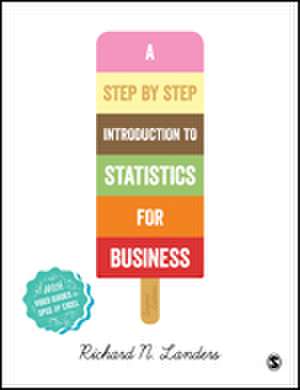A Step-By-Step Introduction to Statistics for Business
Autor Richard N Landersen Limba Engleză Paperback – 19 dec 2018
Each chapter features a real-world business situation and accompanying dataset, the reader is then encouraged to identify the correct statistical concept in the chapter and solve the problem outlined. Offering students a chance to use the newly learned theory in a practical way.
New to the second edition:
- A “Review of Essential Mathematics” prologue, featuring tests and further links to help students refresh their knowledge of the core mathematical concepts used to calculate basic statistics.
- Updated screenshots on using IBM SPSS and Excel.
- A “Statistics in the Real World” feature included at the end of each chapter, demonstrating how statistics are applied in real-world business settings and research, accompanied by reflective questions.
- Updated case studies, examples and diagrams, illustrating key points and helping to reinforce learning.
Essential reading for business students wanting to know how to use statistics in a business setting.
Preț: 377.87 lei
Preț vechi: 484.45 lei
-22% Nou
Puncte Express: 567
Preț estimativ în valută:
72.30€ • 75.69$ • 59.83£
72.30€ • 75.69$ • 59.83£
Carte disponibilă
Livrare economică 17-31 martie
Livrare express 28 februarie-06 martie pentru 46.74 lei
Preluare comenzi: 021 569.72.76
Specificații
ISBN-13: 9781473948112
ISBN-10: 1473948118
Pagini: 496
Dimensiuni: 189 x 246 x 27 mm
Greutate: 0.95 kg
Ediția:Second Edition
Editura: SAGE Publications
Colecția Sage Publications Ltd
Locul publicării:London, United Kingdom
ISBN-10: 1473948118
Pagini: 496
Dimensiuni: 189 x 246 x 27 mm
Greutate: 0.95 kg
Ediția:Second Edition
Editura: SAGE Publications
Colecția Sage Publications Ltd
Locul publicării:London, United Kingdom
Recenzii
Richard N. Landers has written an excellent text. Put simply, A Step-by-Step Guide to Statistics for Business needs to be core reading for all students undertaking statistics as part of a Business or Management programme. Landers writes in an accessible and easy-to-follow style, which leads the reader from basic numeracy to inferential statistics.
Cuprins
Prologue: Review of Essential Mathematics
Part 1. Descriptive Statistics
Chapter 1. The Language of Statistics
Chapter 2. Working with Numbers and Data Display
Chapter 3. Central Tendency and Variability
Chapter 4. Probability Distributions
Chapter 5. Sampling Distributions
Part 2. Inferential Statistics
Chapter 6. Estimation and Confidence Intervals
Chapter 7. Hypothesis Testing
Chapter 8. z-Tests and One-Sample t-Tests
Chapter 9. Paired- and Independent-Samples t-Test
Chapter 10. Analysis of Variance (ANOVA)
Chapter 11. Chi-Squared (x2) Tests of Fit
Chapter 12. Correlation and Regression
Part 3 Wrap-Up
Chapter 13. Matching Statistical Tests to Business Problems
A1. z-Table
A2. t-Table
A3. F-Table (cx = 0.5)
A4. F-Table (cx = .01)
A5. X2-Table (chi-squared)
B1. Inferential Test Reference Table
B2. Inferential Test Decision Tree
C. Glossary
D. Statistical Notation and Formulas
E. Enabling Excel’s Data Analysis Add-In
Part 1. Descriptive Statistics
Chapter 1. The Language of Statistics
Chapter 2. Working with Numbers and Data Display
Chapter 3. Central Tendency and Variability
Chapter 4. Probability Distributions
Chapter 5. Sampling Distributions
Part 2. Inferential Statistics
Chapter 6. Estimation and Confidence Intervals
Chapter 7. Hypothesis Testing
Chapter 8. z-Tests and One-Sample t-Tests
Chapter 9. Paired- and Independent-Samples t-Test
Chapter 10. Analysis of Variance (ANOVA)
Chapter 11. Chi-Squared (x2) Tests of Fit
Chapter 12. Correlation and Regression
Part 3 Wrap-Up
Chapter 13. Matching Statistical Tests to Business Problems
A1. z-Table
A2. t-Table
A3. F-Table (cx = 0.5)
A4. F-Table (cx = .01)
A5. X2-Table (chi-squared)
B1. Inferential Test Reference Table
B2. Inferential Test Decision Tree
C. Glossary
D. Statistical Notation and Formulas
E. Enabling Excel’s Data Analysis Add-In
Notă biografică
Descriere
A clear and concise introduction to statistics for business and management students, demonstrating how important statistics are in the business decision-making process and covering everything from conducting a survey and collecting data, to summarizing statistical data, and presenting findings.
